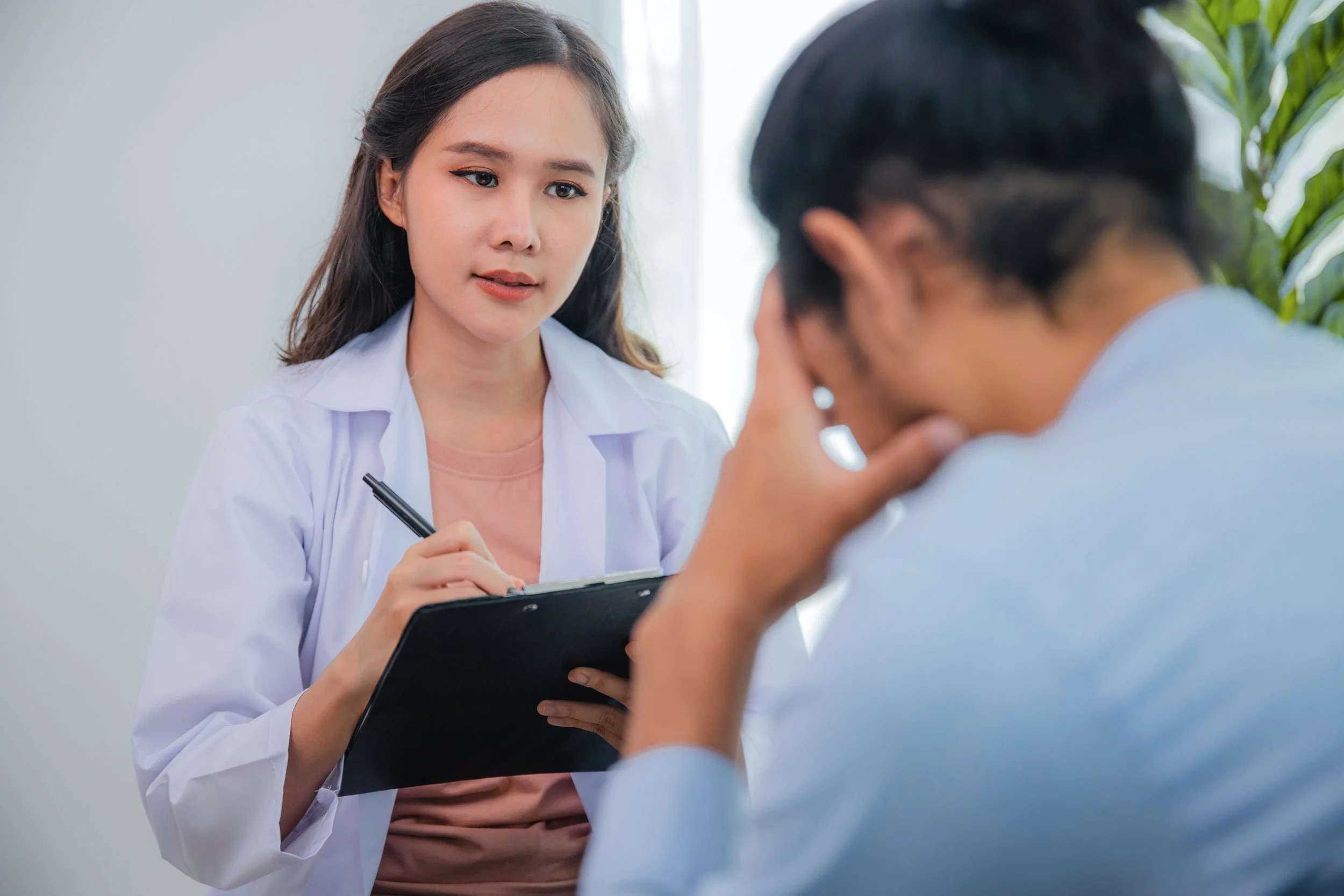Understanding Antidepressant Medications Part 1: How to Use Them Safely
Dr. David Gardner
Author: Dr. David Gardner, Professor & Community Psychiatry Research Director, Department of Psychiatry, Dalhousie University, and Executive Member of the Network
Critical review: Dr. Soham Rej, Associate Professor and Geriatric Psychiatrist, Department of Psychiatry, McGill University
What Are Antidepressants?
Antidepressants are medications prescribed to treat depression and anxiety. Canadians of all ages use them, from children to older adults. In 2022, approximately 1 in 6 Canadians (17%) were prescribed an antidepressant. Women and older adults tend to use them more often than others.1
A lot goes into decisions to start, continue, and stop taking antidepressants. You need to weigh the benefits against the risks and also consider other aspects of your health and personal circumstances. This article describes the uses, benefits, side effects, and safety concerns of antidepressants. In “Part 2: Stopping Antidepressants Safely,” you’ll learn about what can happen when you try to stop these medications. You’ll also find out how to do so safely.
Did You Know? Among Canadians aged 71 and older, 1 in 3 women and 1 in 5 men are prescribed an antidepressant per year. 1
Why Do People Use Antidepressants?
Antidepressants are most often used to treat depression and anxiety. They’re also used for several other health issues. Some examples include chronic pain, obsessive-compulsive disorder, insomnia, migraines, and quitting smoking.2
Here is a list of common antidepressants:
| Class | Drug name | Brand name* | Class | Drug name | Brand name* |
|---|---|---|---|---|---|
1 |
Citalopram |
Celexa |
2 | Desvenlafaxine Duloxétine Levomilnacipran Venlafaxine |
Pristiq |
3 |
Bupropion |
Wellbutrin |
4 | Mirtazapine | Remeron |
5 |
Amitriptyline |
Elavil |
6 | Viladozone Vortioxétine |
Viibryd |
* Most listed antidepressants are manufactured and sold in Canada under various generic brands.
How Do Antidepressants Work?
Most antidepressants work by changing the amounts of chemical messengers in our brain. These messengers allow our brain cells (neurons) to adapt and communicate better with each other. It is these changes, which take several weeks to be fully realized, that lead to reduced symptoms of depression and anxiety. Antidepressants vary in how they affect the chemical messengers and the types of chemical messengers that they affect. This is why people respond differently to different antidepressants, both in terms of their symptom improvement and the side effects they experience from the medication. For antidepressants to be effective, they need to be taken daily and at a consistent dose.
Are Antidepressants Effective?
Antidepressants help many people with depression and anxiety feel better. But they don’t work for everyone. Some people who take them feel a lot better. They may even see all their symptoms go away. Others feel only somewhat better. And some either don’t feel better at all or cannot tolerate the side effects. The likelihood of each of these different types of responses to an antidepressant is shown here:3-5
If the first antidepressant you try isn’t helping or is causing problems, you can switch to a different one. This happens often. The goal of taking an antidepressant is for you to feel as good as possible. Ideally, you’ll feel a lot better and have no or very mild lingering symptoms or side effects. However, finding the right antidepressant can be a trying process. This is because it takes time to determine how you respond to different antidepressants. Several weeks can pass by for each antidepressant you try.
It’s important to know what your symptoms are and how they respond to treatment. This will help you figure out how well the antidepressant is working for you. Listed here are common symptoms of depression and anxiety disorders.
Symptoms of depression3*:
Loss of interest or pleasure in most or all usual activities
Feeling sad, tearful, empty, or hopeless
Easily frustrated and irritated
Difficulty focusing and concentrating
Trouble sleeping, or sleeping too much
Change in appetite (eating too much or too little)
Suicidal thoughts
Lack of energy
Symptoms of anxiety6*:
Constant worry, stress, or restlessness
Feelings of impending doom, danger, or panic
Excessive fatigue
Pounding heart, increased sweating, trembling, or shaking
Difficulty focusing and concentrating
Muscle tension
Trouble sleeping
Easily frustrated and irritated
*There are different types of depression and anxiety. The symptoms listed here are common for all types of depression and anxiety disorders.
Within the first few weeks of starting an antidepressant, your symptoms should gradually get better. And they should continue to improve over the next two to three months. However, if your symptoms don’t improve much after the first two to four weeks, you might need to change your medication. This could involve trying a different one or adding a second treatment.3,4
What Are the Treatment Options for Depression and Anxiety?
Antidepressants are often used to treat depression and anxiety. However, they are not the only option. Talk therapy is also effective. With this type of therapy, you see a therapist to work on thoughts and behaviours that help alleviate your symptoms. There are also effective online versions of therapy available.
For mild symptoms, talk therapy on its own is considered the best treatment option. For moderate to severe symptoms, a combination of talk therapy and antidepressants is recommended.3,4 However, for many, accessing talk therapy can be challenging or not an option.
There are additional things you and others, like family and friends, can do to help you feel better. Reducing loneliness is very important. It can be hard to seek help or companionship when you feel depressed or anxious. Support from family and friends can make a big difference. Regular exercise can also help improve your symptoms and overall health. Take a look at the Canadian 24-Hour Movement Guidelines.7 They provide information about being active, reducing the time you are inactive, and getting enough sleep. Working to follow these guidelines can help reduce feelings of anxiety and depression.8-10
Are Antidepressants Safe?
Like any medication, antidepressants can cause side effects. Some are short term and go away after a few days. Feeling dizzy and nauseous are two examples. Other side effects, like feeling sleepy or having sexual problems, can be related to your dose. The higher the dose, the more likely you are to have the side effect. Some side effects persist or can become more of a problem over time, such as dry mouth and increased appetite leading to weight gain.
Some side effects are unpredictable and occur infrequently. These types of side effects are more likely to happen soon after starting the medication. Allergic reactions to medications are a good example. Another example, more specific to antidepressants, is when the antidepressant causes the amount of sodium in the blood to lower. This is a very unusual side effect, and it can’t be predicted. It can lead to a condition called the Syndrome of Inappropriate Antidiuretic Hormone (SIADH). People who develop SIADH become disoriented and confused and may experience seizures. When SIADH occurs, it is a medical emergency.11
Another important concern with antidepressants is the potential for adverse interactions with other medications you take. For example, a rare but potentially serious drug interaction involving antidepressants can lead to what is known as serotonin syndrome. This happens when medications interact to cause too much serotonin activity in the body. In milder cases, it can cause symptoms like feeling very jittery and on edge, shivering, and sweating. When more severe, you can quickly become confused and require immediate medical attention.12,13
Do Some Groups Have a Higher Risk of Side Effects?
Older People
As you age, changes in your body make you more sensitive to the effects of medications. Antidepressants are no exception. Older people are more likely to experience falls and SIADH than younger people when taking antidepressants.15,16 To limit these and other risks, the recommended doses of antidepressants are usually lower for older people.7
Children, Adolescents, and Young Adults
People of any age who live with depression and anxiety often have negative thoughts about themselves and may be thinking about suicide. They also sometimes show behaviours of self-harm and go beyond thinking to planning and attempting suicide. Some children, teens, and young adults may have new or worse thoughts about suicide when starting an antidepressant. The risk is estimated to be 1 in 30 to 1 in 50. If this happens, the antidepressant may need to be stopped.17
This is a very concerning problem that needs to be discussed before the medication starts and during the course of treatment. Health care professionals are to check for these thoughts and behaviours before starting an antidepressant and every week for the first month of treatment, then regularly but less often thereafter.
- Start an antidepressant
- Start another medication while already taking an antidepressant, including prescription and over-the-counter medications, and natural health products
- Have questions or concerns about your antidepressant
Can Antidepressants Stop Working?
Sometimes, even when people take antidepressants regularly, their symptoms come back. It might seem like the antidepressant isn’t working as well as it used to. But usually, it’s because the illness itself is changing. Depression and anxiety can get better or worse on their own over time.
Taking an antidepressant that is working well for you reduces the chance of your symptoms returning. In this way, antidepressants have a preventative effect. However, antidepressants don’t eliminate the risk that your symptoms will one day return. Your symptoms can still come back or get worse while taking the medication. When this happens, sometimes increasing the dose or adding a second medication can help. You may also want to explore non-medication therapies if it’s an option for you.
Will I become addicted to my antidepressant?
Antidepressants do not cause addiction. However, they are associated with physical dependence and withdrawal effects. Overall, about one in six people stopping antidepressants experience withdrawal symptoms.18 However, this rate varies depending on the antidepressant. For example, the risk is higher with paroxetine and lower with mirtazapine. Withdrawal symptoms (ex., fatigue, dizziness, nausea, headache, insomnia, tension) are an indication of physical dependence. Withdrawal symptoms are more likely to happen when you stop taking an antidepressant suddenly. This is different from addiction. Characteristics of addiction (that do not apply to antidepressants) include:
taking larger than recommended doses
trying to cut down their use but not being able to due to cravings and urges for the substance
spending a lot of time thinking about how to get the substance
spending a lot of time recovering from the effects of the substance
Stopping antidepressants by gradually reducing the dose helps to minimize or avoid withdrawal symptoms. More details about this are in Part 2 of this article.
What Should You Talk About With Your Doctor, Pharmacist or Nurse When It Comes to Antidepressants?
It’s vital to talk to your healthcare professional when you start taking antidepressants. Just as important is to keep talking with them while taking the medication. Keep in mind that changes in effectiveness and side effects can occur at any point, including when starting, continuing, changing doses, switching between, and when stopping antidepressants.
Here Are Some Important Things to Discuss With Your Healthcare Professional:
Why you’re taking the antidepressant and how it’s supposed to help.
How you’ll know if it’s working.
When you should start feeling better.
How long you should keep taking it.
Side effects to watch out for and what to do about them.
What you can do, in addition to the antidepressant, to have the best chance of feeling well and staying well.
Alternative treatment options for your condition.
How the antidepressant could interact with your other medications or health problems.
Part 2 of this article focuses on how to safely stop antidepressants:
The views expressed herein do not necessarily represent the views of Health Canada









